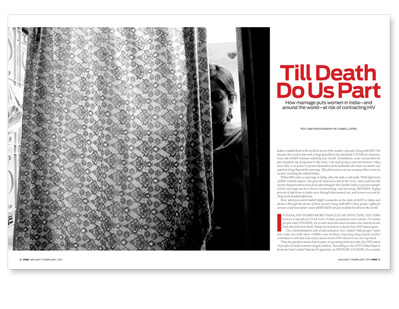 |
India is ranked third in the world in terms of the number of people living with HIV, but because the country has such a large population (an estimated 1.15 billion), its prevalence rate of HIV remains relatively low overall. Nonetheless, some communities do face elevated risk of exposure to the virus. One such group is married women—they have little or no power to protect themselves from husbands who have sex and/or use injection drugs beyond the marriage. This phenomenon is true in many other countries as well, including the United States.
When HIV enters a marriage in India, often the wife is cast aside. With high levels of HIV-related stigma, low general awareness about the virus, and a patriarchal society that prevents women from advocating for their health, India is a prime example of how marriage can be a barrier to preventing, and surviving, HIV/AIDS. Eighty percent of infections in India occur through heterosexual sex, and women account for 39 percent of adult infections.
Here, photojournalist Isabell Zipfel comments on the state of AIDS in India and shows—through the stories of three women living with HIV—how greater rights for women could mean fewer cases of HIV/AIDS not just in India but all over the world.
In India, HIV evokes more than just an infection; the term is more a repository for all sorts of fears, prejudices and rumors. For many people with HIV/AIDS, the social ostracism and exclusion are almost worse than the infection itself. Many try therefore to keep their HIV status quiet.
The criminalization and social exclusion of so-called “risk groups” (men who have sex with men—MSM—sex workers, injecting drug users) further contribute to the fact that many cases of new HIV infection are not reported.
Thus the paradox arises that in spite of a growing infection rate, the HIV status of people in India remains largely hidden. According to the 2010 Global Report from the Joint United Nations Programme on HIV/AIDS (UNAIDS), the country has an estimated 2.4 million people living with HIV/AIDS—but that figure could be significantly higher, as many people do not get tested.
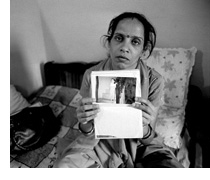 |
India’s health system further ensures the discrimination and stigmatization of people with HIV/AIDS. The medical records of those affected are often insensitively handled, and people living with HIV frequently receive worse service than other patients. In some cases, they are completely denied any sort of medical treatment.
Together, these factors seriously hinder efforts to adequately treat people with HIV. They also undermine prevention and education programs.
India’s patriarchal structure and the systematic way it places women in positions of weakness heighten women’s vulnerability to HIV/AIDS. In India, many women have no right to sexual self-determination. And because of India’s age-old traditions, most do not choose whom to marry or when. Today, it’s estimated that 90 percent of all marriages in the country are arranged marriages.
If women become HIV positive, they experience further discrimination, particularly since wives are frequently held responsible for their husbands’ HIV status. Even though it is often the men who bring HIV into the marriage, it is the women who will be socially ostracized and banished from the marital home.
Because women mostly do not have their own income, there is often nothing else they can do other than to return to their parents’ house—if they are even allowed to come home. Many are not as this amounts to an admission of their failure as a wife and daughter. The result for many is that a positive status brings drastic and immediate restrictions in economic, social and interpersonal resources.
People with HIV/AIDS in India feel compelled to live outside the usual traditions and norms, in a world in which rules of caste and religious membership are no longer valid. People living with HIV have to find a new place for themselves in the rigid and hierarchical Indian society. In short, they have to reinvent themselves—and their lives.
The following three stories showcase that truth. They were told to me by three Indian women who contracted HIV while married. Their names are concealed to protect their privacy and safety.
I carried out the photo reportage and life history interviews mainly in Delhi. DPWN (Delhi Positive Women Network) provided me with valuable help in making contacts locally.
J., 24
I am 24 years old, and I am a widow. I married at the age of 16. My mother arranged the marriage. My husband was 28 years old. But my father didn’t like my husband. He always told my mother: “Don’t marry my daughter to that boy, she is too young.” My mother liked my husband. His financial background was very good. In the first night after the marriage, my husband started to touch me. I asked him not to, I didn’t feel ready for it, I was too young. My mother-in-law was very good; after a while she came into our room and told my husband not to do anything with me. She took me to her bedroom. So in the first night I slept with my mother-in-law.
After three days, my husband started to touch me again. Again I felt scared. Again I rejected him. I went to my mother-in-law. After 15 days, my husband started to drink. He was not satisfied with me at all. After drinking he came into our room and started to touch me. Then he forced me to have sex with him. My husband was always drunk, so my mother-in-law advised him not to drink. She told him: “Don’t do that, you have to be good to your wife, you have to take care of her.” He didn’t listen to her. He thought, “She is my wife, it is her duty to tolerate all that.”
After these discussions he always went straight off to the wine shop and drank a lot. Then he came back home. Weaving. Falling. When he entered the room he called me. He started to take my clothes off and forced me to have sex with him. Every day. Then he vomited and fell to the floor again. I took care of him, I washed him. I cleaned the room. I never told these things to anybody, because he was my husband. If I had told anyone, they would have said, “You are his wife, you have to deal with the situation. That is your duty.”
My husband had a good job. But he drank. So he lost his job. His boss told him not to come to the office anymore. At that time he wanted to have sex with me all the time. So I learned to lie down on the bed and to accept it. I told him, “I don’t want to have sex, but if you need it, just do it.” He didn’t take care of me at all; he just always came into the room, called me and asked for sex. When he was not having sex with me, he didn’t notice me at all. He didn’t even know where I was.
After a while I got pregnant. I got pregnant again. At length my husband got ill. He had a fever for one month. I told him to go to the hospital. The doctor found out that many parts of his body were damaged because of his permanent use of drugs. But he did not find out why my husband had a fever all the time. The doctor gave him some medicine, but the medicine didn’t work. Then he took an HIV test. The result was positive. The doctor asked me, “Did your husband have a relationship with another woman? Is your husband satisfied with you? You know that he would never go to another woman if he was satisfied with you?” I said, “My husband is satisfied with me.” The doctor told me and my daughters to take a test as well. It came out that me and one of my daughters were HIV positive.
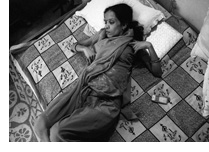 |
My sister-in-law started to separate the buckets of water for the shower. She bought her own soap. When she was cooking she asked me not to touch the vegetables. She advised all the neighbors not to talk to me. She told them that I was HIV positive. Everyone started to harass me. My husband’s family blamed me because my husband was HIV positive. They accused me of infidelity, they told me that it was all my fault. One day my family asked me to go to Lucknow to worship. My husband and I went there alone. So my husband felt free to do whatever he wanted to do. Nobody could advise him to take the medicine and not to drink. He started to drink and to eat non-vegetarian food. He forgot to take the medicine. His state of health became very serious. He got TB. So we decided to bring him to the hospital.
He died on the way to the hospital. I was 21 years old.
After that I was alone in my home with my two kids. My sister-in-law made a lot of problems. Sometimes I put on a new dress. Then she asked me: “Why are you wearing that kind of dress?” She looked at my makeup and told me to remove it. She accused me of wearing the new dresses and the makeup to attrack her husband. She said, “You are jealous of me, because you are a widow.” So I started to wear simple dresses and not to put on makeup anymore.
When somebody came to my home, my sister-in-law would shout: “She is HIV positive, she is cursed.” All my family members asked me to marry again, just to leave the house. Nowadays I don’t have any money to do anything. I don’t have a job, I don’t have any support. My husband died, so nobody gives me any money to live. I always go outside with my mother-in-law. People ask me, “Why do you take your mother-in-law with you? Go alone!” But when I go out alone, I have the problem that I don’t have any money, even to take the bus. So I walk.
S., 28
I am 28 years old, and I am married. In the first part of my marriage, my life was great, but after six months my husband started to get very sick. He had stomach problems. He had a fever. He got very, very ill. His weight was 32 kg (nearly 71 pounds). The doctor gave him a lot of medicine, but it didn’t have any effect.
One friend told my husband to take an HIV test. The result was positive. The doctor wrote on the report that my husband was HIV positive. So everybody got to know that he was HIV positive. The medical staff advised everyone not to touch my husband because he was supposed to be contagious. In the hospital he was always the last to get food. His bed was in a separate room. The room was very dirty. There was a lot of dust, and there were a lot of mosquitoes.
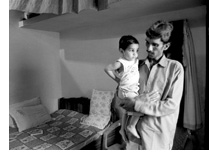 |
After two days I took my husband home. My mother started to separate all the dishes. The bed was separated; the room was separated. One day somebody told us to go to Delhi to the hospital. So I went there with my husband. The doctor, after having read about the HIV status of my husband, gave us the feeble excuse that there was not any room available. He told us to ask somebody else in the hospital. We had to go downstairs, we had to go upstairs. We had to go to this office, we had to go to that office. My husband was very weak; he couldn’t move his legs at all.
After three days of going around and around and asking everybody in the hospital, it was clear that they would not admit my husband to the hospital. The doctor told me to take him away and to take care of him by myself. And he told me to test myself also. The results were positive. All this happened after the first six months of our marriage.
When my husband’s family heard that my husband was HIV positive, everybody shouted at me. My mother-in-law and the rest of the family said that all the problems started the moment I came into their house. They said, “You are the main reason for all our boy’s problems. You are a very bad girl. You are not good for our family.” They all asked themselves, “What happened? Before his marriage our boy was a very happy person, he was always laughing, but after the marriage he got very sick.”
My family did not support me either. They just asked me to come back home and to leave my husband. But I wanted to live with him. I wanted to take care of him. I didn’t want to leave him. I broke off contact with my family. I did not go there for two years. One person told me about a care home for HIV-positive people in Delhi. I went there. My husband was admitted there. Somebody advised me to go into a care home for women. But in this care home most of the women were taking drugs. I did not want to stay there.
I did not have any money. I did not have a job. Antiretrovirals were very expensive at that time. I couldn’t afford them at all. During the day I stayed in my husband’s care home. There I learned how to take care of patients. After some time I searched for a job as a nurse. The salary of my first job as a nurse was 1,500 rupees (about $33). With this money I started my new life. I was living alone so I had to walk around alone. There was nobody to protect me. Men were watching me. They were staring at my breasts. But at that time my husband was not able to protect me.
I started to give interviews to the media about my life as an HIV-positive person. Then my family members blamed me again, because my brother didn’t get a wife. They said: “It is your fault—everybody knows now that you are HIV positive.” I thought, “I am in Delhi, I have to survive. This is my life. I have to take care of myself.” After three years, my brother finally got married, and my family wanted me to come home again to the wedding ceremony. I didn’t go. I was too afraid that they would start to blame me again.
Now I am very depressed. I ask myself: “Should I die? Should I commit suicide?” I think that my life is very bad. I am not satisfied at all. I do not get any support from my family. I do not get any love from them. The only person I get love from is my husband. I am disappointed with my life. The only thing I want is love. Is there anybody who could give me some love? I don’t want any property. I just want love. But, apart from my husband, nobody loves me.
Yesterday I felt sick. So my husband called my brother in the night. My brother told him, “Call me back in the morning; I don’t have time now.”
I., 37
I am 37 years old, and I married for the second time. I got married at the age of 16. My husband was working in Dubai, so he always left Delhi to work there. Sometimes he went to Dubai for three months, sometimes for six months, sometimes for one year.
In Dubai he injected drugs. His family shouted at him, advising him not to take drugs. My mother-in-law asked, “Why do you take drugs?” My husband answered, “I need the drugs.”
His salary was 25,000 rupees per month (about $554). But he never sent the money home. I asked him, “Where is the money?” He never answered.
In the meantime I gave birth to two children. Again I asked him, “What are you doing with all the money?” He said, “I don’t want to tell you.” I went to my father-in-law and asked him, “What is my husband doing with all his money? He is getting 25,000 Rs per month. He doesn’t send anything back home!” My father-in-law told me, “He takes drugs, and he goes to prostitutes. Prostitutes in Dubai ask for 6,000 Rs per night. He is spending all his money on his bad habits. That’s why he does not send the money back home.”
I was worried and scared. I wanted to talk to my husband about it, I wanted to advise him not to go to prostitutes, but I did not have the power to do it. I never complained about my husband, because my mother-in-law and my father-in-law were very good to me.
When my husband was in India, he never had enough money for drugs. That’s why he tried to sell everything. One day he tried to sell the bed, too. I shouted at him. Then he told me, “OK, I will not sell the bed, but there is a guy who would pay 1,500 Rs for one night with you.”
He even sold my mangalsutra. It was my wedding necklace. It was a very powerful chain. He shouted, “Give it to me, I have to sell it. I need drugs.” He took the chain. I said, “OK, take it. But take your life with you as well.”
In a way that is what happened. One day my husband became very ill. I went with him to the hospital. The doctor said, “Your husband’s body is completely damaged. He will only live for some days.” He was admitted to the hospital.
One night my husband asked me to stay with him. I said, “I will come back in the morning. I have to look after the children.” During that night my husband died.
I married my husband’s brother. He was very good and caring. I gave birth to my third child. One day my second husband became very ill. I took him to the hospital. The doctor did an HIV test. The result was positive. His condition was very bad. The doctor said that my second husband would not survive. I asked him what I should do. The doctor told me, “Go home and take care of him.”
The doctor gave him ARVs. The medicine was expensive. But we didn’t have any money. So we sold our house.
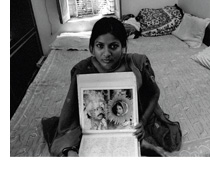 |
After one year I had an HIV test done on my third child. The result was positive. So the doctor told me to check myself, too. I took an HIV test, the result was positive. I know for sure that my first husband was HIV positive, that he had transmitted the virus to me. Nobody had tested him, because at that time nobody knew about HIV/AIDS.
After a short period of time my third child died.
In my first marriage my life was good. My husband earned 25,000 Rs, my father-in-law 35,000 Rs ($775). We were rich. We even had animals, some cows and buffaloes. My house was very big. The situation started to become bad as my first husband became ill. After that my second husband got ill as well. We had to spend so much money on both of them, and I had to arrange the marriage of my daughter. Now there is no money at all anymore.
Sometimes we eat in the morning, but in the evening we cannot eat, because there is nothing to eat. My second husband does not work, he is too sick. My father-in-law gets a small pension. He gets 1,000 Rs ($22) per month. How can you live on 1,000 Rs per month? Before all this happened nobody wanted me to work outside the house. But now the situation has changed—there is no money at all. Now I have to earn money. But how do I find a job?
Isabell Zipfel grew up in Rome and now lives in Berlin. Before embarking on her career as a photojournalist, she translated screenplays and earned a master’s degree in German studies and Italian literature at Berlin’s Humboldt University. She has been working as a photojournalist since 2007.
Not all of the individuals in these photographs are HIV positive nor are they necessarily representative of their corresponding story. The images and interviews were obtained with the help of the Delhi Positive Women Network.






2 Comments
2 Comments